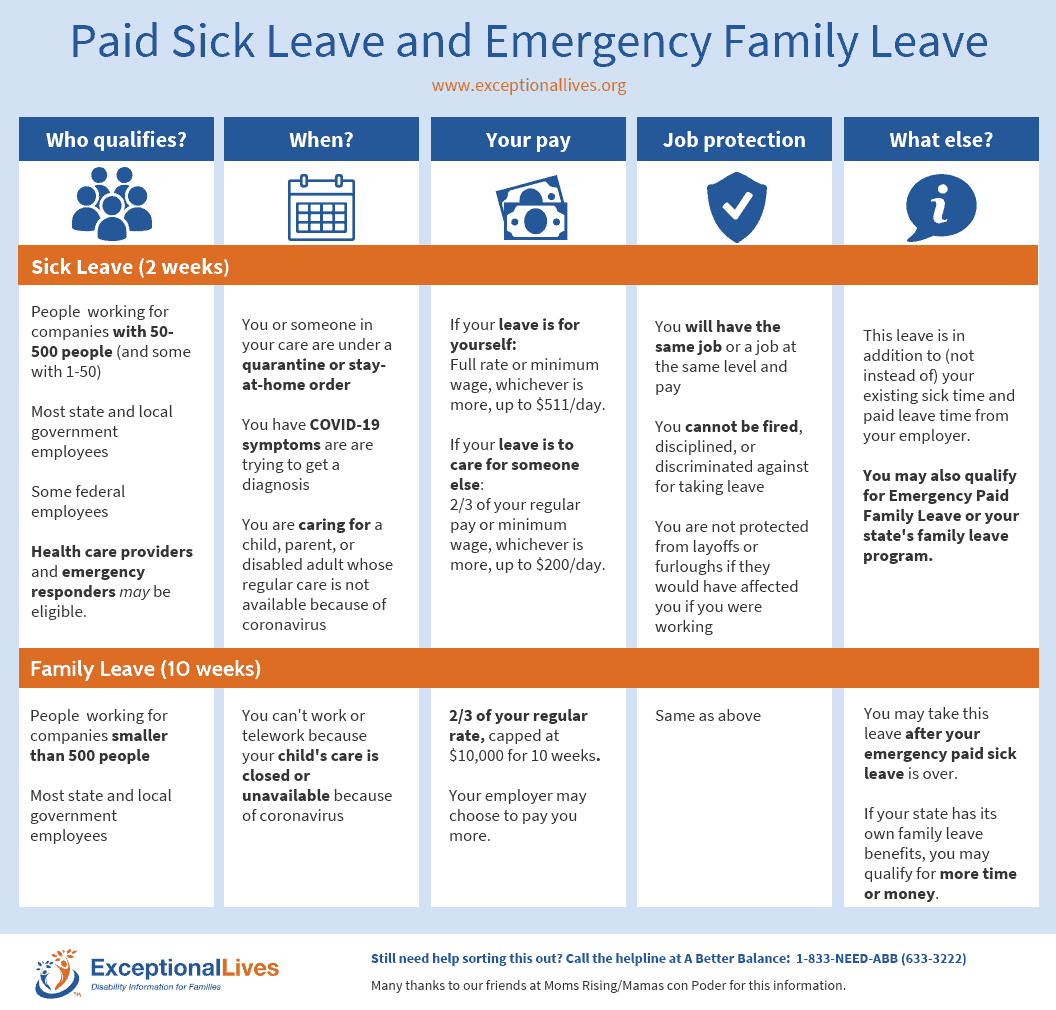
Update: As of 12/28/2020, it appears that employers will no longer be required to pay for emergency family leave except in individual states that provide this benefit already. This limits workers’ ability to quarantine after COVID-19 exposure or care for a child or adult with a disability whose school or day care is closed. It is not yet clear if employers will be required to pay for sick leave for workers who have COVID-19. We will update this post as soon as more information becomes available.
You may have heard about the new Emergency Paid Leave policy (also called the Families First Coronavirus Response Act).
Maybe you already know that this is a policy that allows you to take time off from work and still get paid. But do you really know about it? I asked some friends, who helpfully reported things like:
“It’s a myth!”
“It’s a unicorn!”
“That’s COVID paid sick leave, right? So you only get it if you get coronavirus.”
“It’s real but they pay you in popcorn!”
“It exists but only, like,19 people qualify!”
Families of children with disabilities really need to know the facts because many of us may need to use this leave. Schools are closed and those of us lucky enough to work remotely are trying to work from the coat closet at home (just me?). At the same time, our kids need meltdown management, diabetes care, help with a snack, supervision while they run around the yard like maniacs, homeschooling support, help with another snack, help with a bath because their PCA can’t be here, support for telemedicine speech therapy, or constant stimulation all day so they don’t take the house apart. Did I mention help with a snack?
For most of us, this is really hard. For some of us, it’s impossible. That’s where Paid Leave comes in.
On April 1st, two new federal Emergency Paid Leave bills went into effect: Emergency Paid Sick Leave and Emergency Paid Family Leave. These bills allow people who qualify to take time off work if they are sick from coronavirus or – and this is important – if they are caring for someone else for reasons related to coronavirus.
How do you know if you qualify? You need to work for a company with 50-500 people. This includes most employees of local and state government. If you work for a company with fewer than 50 people, you may still qualify, but it’s up to your employer. Same goes for first responders and health care workers. (Our friends at Moms Rising/Mamas con Poder have a petition to Congress you can sign asking them to include these workers too).
Federal employees don’t qualify for Paid Family Leave, but might still qualify for Paid Sick Leave (more on this in a minute).
With both forms of leave, you will have the same or equivalent job when you go back to work. You can’t be discriminated against, disciplined, or fired for taking this leave.
What’s the difference between the two kinds of paid leave?
Emergency Paid Sick Leave lets you take up to 2 weeks off if you can’t work because you are sick with coronavirus or caring for someone in your family who is sick with it. You can also use this leave to care for a child (including a disabled adult child) or a parent whose usual school, care center, or care provider is closed or unavailable because of coronavirus.
Emergency Paid Family Leave lets you take up to 10 weeks off if you can’t work because you are caring for a child (again, including a disabled adult child) whose usual school, care center, or care provider is closed or unavailable because of coronavirus. This is on top of the 2 weeks for Paid Sick Leave.
It’s important to know that if you have already used your regular Family and Medical Leave Act (FMLA) leave this year, you might not qualify for emergency leave. (This is complicated. Check out #9 on this page). But if you live in Massachusetts or another state with its own paid family leave, you might qualify for more time or more pay.
This is complicated, so we created this infographic to help you sort this out.

What you can do
The first thing to do if you think you need to take Emergency Paid Leave is talk to your employer. If you’re worried about your rights or your employer is not sure if you qualify, call the free, confidential helpline at A Better Balance: 1-833-NEED-ABB (633-3222).
We are grateful to Moms Rising/Mamas con Poder for their advocacy and research on this issue. Please refer to their website for more details and information.




